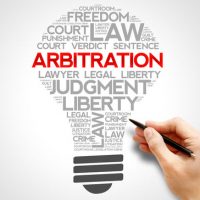Arbitration Clauses Should be Broad

If you enter into construction contracts, you may have or want to enforce arbitration provisions in your construction contracts. But how broad are arbitration provisions? Do they cover all claims that arise between a builder and other parties, or only the kinds of claims specified in the construction contract?
Builder Tries to Enforce Arbitration Clause
A recent case addressed just this issue. A homeowner entered into a construction contract with a builder. When the properties were built, they had water damage, and water intrusion problems. The homeowners sued for negligence, and other statutory claims—not claims that are inherently construction law claims.
Because of this, when the builder tried to enforce an arbitration agreement in the construction contracts, the Court denied the builder’s motion. The court said that the claims brought by the homeowners were not the kind of claims covered by the arbitration agreements.
Appellate Court Looks at Contract’s Wording
The builder appealed the case. In a demonstration of just how important one little word can be, the appellate court ruled for the builder, finding the homeowner’s claims did fall under the arbitration agreement because of the wording of the arbitration provision.
Unlike some arbitration claims, which require arbitration for any claim “arising from” or “arising out of” the construction law contract, the arbitration provision here was much broader, requiring arbitration for claims arising out of or “relating to” the contract. That means that the arbitration agreement was enforceable for any claim that just had a significant relationship to the contract.
Thus, even though negligence claims are not construction law claims, and even though the construction law contracts didn’t address statutory claims or negligence, the negligence claims brought by the homeowners had a close enough relationship to the construction, that the arbitration provisions were enforceable. In other words although negligence is what is known as a tort, they were related to the construction.
Keep Language Broad
The moral of this story is that even the smallest, most subtle language can mean the difference between being able to arbitrate your case, or not being able to arbitrate your case. Construction contracts often encompass breaches of the construction law agreement, but there are loads of other claims that someone can make in the context of a construction project.
Florida’s Deceptive and Unfair Claims Practices Act, promissory estoppel, warranty claims, fraud, negligence, or other claims, whether created by Florida laws or by long standing common law, can go far beyond the terms and scope of your construction law contract. In fact, it is often impossible to list every kind of potential claim that can arise in the context of a construction law or contractual dispute.
However, when provisions like limitations of liability, indemnification clauses, or mandatory arbitration are involved they can be worded in such a way that they can protect your company even without listing every possible claim or lawsuit.
Call our Fort Lauderdale business attorneys at Sweeney Law P.A. at 954 440-3993 for a consultation or help with your construction law problems.
Resource:
leg.state.fl.us/statutes/index.cfm?App_mode=Display_Statute&URL=0500-0599/0501/0501PARTIIContentsIndex.html
https://www.sweeneylawpa.com/business-interruption-claims-due-to-the-covid-19-pandemic/

